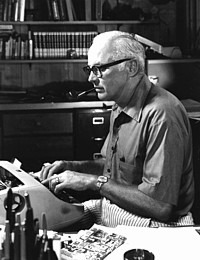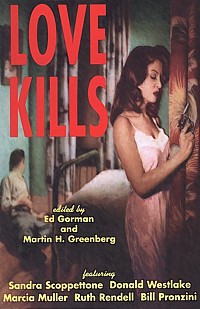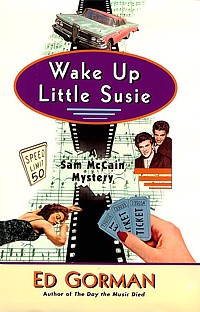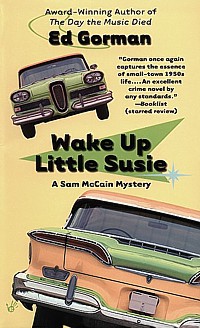"My
world view seems to reflect . . . A certain weary hope for humankind, . . .
and more pity than rage."
- Ed Gorman
Feo Amante's Horror Home Page
Presents:
An interview with
ED GORMAN
by Harry Shannon
Ed Gorman has become a legendary figure among both fans and authors of
dark fiction. I have been reading his stories for decades, so I was
amazed to discover that he has only been publishing books for about
the last sixteen years, when he walked away from a successful career
in advertising to pursue writing full time. Within that limited frame,
Ed has produced more than thirty novels and short-story collections,
averaging roughly one every six months. He has published original crime
noir, mystery series, collections and even westerns in addition to his
horror and dark fantasy efforts; has edited anthologies and co-created
Mystery Scene magazine, been nominated or mentioned for nearly every
imaginable writing award at one time or another (Edgar, Spur, Stoker, Shamus) and yet remains surprisingly unappreciated.
Ed Gorman is also a very intense and private man, although he has recently
gone public about his ongoing battle with cancer. I was delighted when
he agreed to be interviewed at length.
-Harry Shannon

The Bulldog of Mystery stares out at the world |
HARRY SHANNON: First, congratulations on your HWA Stoker nomination for THE DARK FANTASTIC (Leisure 2001). It's well deserved. Haven't you been nominated before?
ED GORMAN: Yes, another one of my collections, "Cages," was nominated.
HS: I noticed you dedicated the book to Leisure Horror Editor Don D'Auria.
Tell us how this collection came about.
Ed Gorman: Don is a sweet guy. He was open to doing a collection,
and so we did it. There was also a second dedication, to Susan Carrithers,
a lovely, sweet, troubled (look who's talking)
woman with whom I had several different kinds of relationships over
the years. She died very young of breast cancer.
HS: That's sad.
Ed Gorman: Yes.
HS: Incidentally, I really enjoyed reading "The Dark Fantastic" and was rooting for it in the Stokers. One of my favorite tales is "Masque,"
which is enough to put you off Daffy Duck cartoons for life. What was
the story behind that one?
Ed Gorman: I wish I had a lofty, artistic explanation for how "Masque" got written. But it was strictly commerce. The editor at Ballantine called me one day and said something to the effect of, "We're ready to put this anthology about mummys into production. But we don't have a stunner. Lots of good stories. But not one that'll punch you in the eye. Could you take a crack at one right away?"
I did it in two or three sittings.
HS:"Different
Kinds of Dead" is another great story…but I understand you
didn't realize how good it was when you first created it.
Ed Gorman: That story seems to have a life of its own, telling me that there are a lot of tired, lonely middle-aged men out there.
It's sort of a documentary of my last years directing TV commercials
all over the place. The dull, disorienting, melancholy of life on the
road.
HS: I recently read an interview you did for the English ezine Crime Time. I was absolutely stunned to read that you wrote your first novel, "Rough Cut," at forty.
Ed Gorman: I wrote stories for men's magazines and for very insignificant literary magazines. Emphasis on "very". And I started dozens
of novels - literally - over the years that I never finished. Then one
morning before work - by that time I owned a small ad agency - I sat down
and started a novel (do or die) as a birthday
gift for my fortieth year. And damned if I didn't finish it. And damned
if it didn't sell to the first publisher I sent it to. My wife Carol and
Max Allan Collins were my greatest supporters and crutched me through
it.

Ed's spiritual influences include
John D. MacDonald |
HS: I also read that you loved my idol, John D. MacDonald and his man Travis
McGee. Whom else do you consider a major influence on your writing?
Ed Gorman: Here's the short answer: As for craft, I learn something
from virtually every type of fiction I read. And every writer. I am
probably closest, in a spiritual way, to John D.in his non-McGees and
Graham Greene and the late and vastly under appreciated Peter Rabe.
My world view seems to reflect theirs. A certain weary hope for humankind,
I suppose; and more pity than rage. Rage, for reader and writer alike,
can burn you out pretty damned fast.
HS: Like that great line at the end of the movie SEVEN. I think Morgan Freeman
quotes: "Someone once said that the world is a beautiful place,
and worth saving. I agree with the second part."
Ed Gorman: Yes.
HS: When I was a kid I bought some books just because of the publisher.
I liked almost everything Fawcett Gold Medal put out, for example. Are
you still a "pulp" fan?
Ed Gorman: Yeah, I am a child of all those paperback lines,
Gold Medal, Ace, Pyramid, Lancer, etc. And sure, I have a few dozen
favorite titles that I reread from time to time.
HS: You have produced more than thirty books in perhaps seventeen years,
which is just amazing. Do you have a set routine for writing? Have you
always maintained that?
Ed Gorman: I
try to do five pages a day, 365 days a year.
HS: Wow. Okay, now for some secrets of the trade. How extensively do you
outline a novel? Do you use, say, an Aristotelian three-act breakdown,
or just go for it?
Ed Gorman: Each novel is different for me. Sometimes I outline
in the three-act way; sometimes I list eight or nine plot points that
shape the novel; sometimes I have only a vague notion of where I'm going
and start in. The last method is perilous for me so I try now to do
at least a crude outline, though the writing process invariably changes
many elements of the plan.
One of
my favorite Ed Gorman novels is "Harlot's Moon," where the
hero Payne deals with the murder of a womanizing priest. It dealt with
trust vs. betrayal on any number of levels. The subplots had Payne dealing
with the return of his abandoning father, who is dying; also with real
trouble in his primary relationship. Meanwhile he is investigating a
Priest who betrayed the women he was counseling by seducing them. Good
stuff.

Ed is
as well known for his editing as his writing. |
HS: There are
a few other Robert Payne novels in print, aren't there?
Ed Gorman: Five in all. They just never caught on the way the publisher hoped they would.
I enjoyed writing them. The particular burden of these books was trying
to make a common, decent man interesting. I made him as un-cynical and
un-macho as possible. The only actor I know who can make a common, decent
man interesting is Bill Paxton, a fine actor who's never gotten his due.
HS: Payne seems like a solid series character for television or films. Has
anyone ever nibbled? While you're at it, tell us your Hollywood horror
story (since we've all got one!)
Ed Gorman: As I recall, there was on option on the first couple of books. But it came
to nothing as those things usually do.
HS: That's the truth. Let's go back to the exploration of trust and betrayal
in "Harlot's Moon" for a moment. Do such themes just emerge
as you write, or do you often start with a "controlling concept"
as well as a plot?
Ed Gorman: On
"Harlot" I had two clear storylines in mind when I typed Chapter
One-I wanted the womanizing priest to trigger an even darker story;
and I wanted to deal with a father-son relationship that was painful
to read about. I wanted to see if I could get Payne to forgive his father.
That section of the story pretty much went off on its own. I just typed
up words that were already in my head.
"Cut-backs
in publishing have over-loaded the handful of editors remaining. So, more than
ever an agent is mandatory."

Ed Gorman's successful Sam McCain series in Hardcover |
Do you currently work with an agent, or shop things yourself? Any comment
on that dilemma for the newcomers?
Ed Gorman: My first four or five novels went out without an agent
but since then I've always used an agent. Today, your agent may give you
the only serious editing you're going to get. Cut-backs in publishing
have over-loaded the handful of editors remaining. So, more than ever
an agent is mandatory. At least I think so but I'm not a wise man on that
subject… or any other for that matter. As for newcomers: It's a bitch,
worse than it's ever been, by far. Just keep trying to interest an agent
in your material is all I can advise.
HS: I've read that you would agree with me that publishing has become less
courteous over the last decade or so.
Ed Gorman: When I'm overworked, I'm not always as courteous as
I'd like to be. I can't really fault editors for that. They're under enormous
corporate pressure now.
HS: Any opinion
on how the Internet might help or hurt publisher and the new writer of
crime and horror fiction?

And in Paperback |
Ed Gorman: I
don't know. There are some very good things published directly on the
net and some very bad things, too. I suppose getting your Internet fiction
in front of the right eyes-editor, agent-is the key.
HS: Actually getting read is always the key. For some reason I have devoured more
of your crime stuff than the pure horror. Can you give us an overview
of your work in the horror genre that led up to "The Dark Fantastic"?
Ed Gorman: Well, I grew up reading an abundance of horror starting with Poe and jumping
quickly to Bradbury, Beaumont and Robert Bloch. Horror is a natural
expression for me, though I certainly wish I were better at it.
HS: You had a tough adolescence and ran with a pretty tough crowd. Can you tell
us about that, and how it may have affected your fiction?
Ed Gorman: I was a juvenile delinquent of sorts until I was
falsely accused of grand larceny. I seemed to be well on my way to reform
school - I was sixteen at the time - until the guilty party finally
stepped forward and fessed up. The experience terrified me so much that
I reformed completely. Got way deep into science fiction fandom, published
my own fanzine, and started writing a lot more. I would've made a lousy
criminal anyway. Too easily spooked.
HS: One of my pet beliefs is that good writers have a message they desperately
want to communicate, and the substance of the message rarely changes.
Do you have a statement about life you keep making with some consistency?
Ed Gorman: Bill Pronzini wrote that my stories are about "outsiders
trying to make their peace with the world." I think that's a pretty
accurate description.
HS: Hey, do you ever miss the advertising business?
Ed Gorman: Yeah, right.
HS: Just kidding. And you always have Mystery Scene, probably that genre's
most respected publication. How did that magazine come about?
Ed Gorman: In 1984 crime novelist Bob Randisi and I decided
that the mystery field needed its own version of the science fiction
news magazine "Locus." That's how it began, though we've always
been more feature-oriented than a straight news magazine. My partner
Marty Greenberg bought Bob out in the late eighties. The magazine wouldn't
have survived its last decade without Marty's ideas and infusions of
cash.
HS: Tell us, what's next for Ed Gorman fans? Do you have more novels in
the pipeline? Perhaps another collection?
Ed Gorman: This year, I hope to write another Sam McCain and a science fiction-horror
novel. Wildside Press will publish a large collection of my western
short stories.
HS: Ed Gorman, you're a gentleman and a scholar. Thanks so much for your
time.
Ed Gorman: Thanks, Harry. Good questions.

|